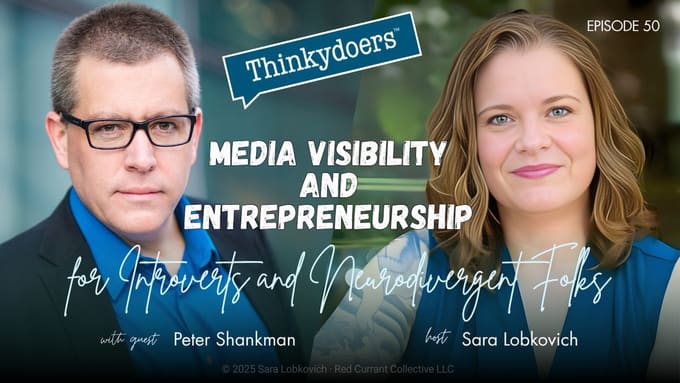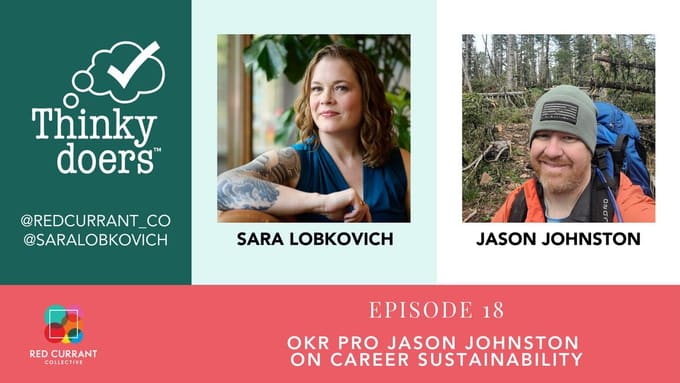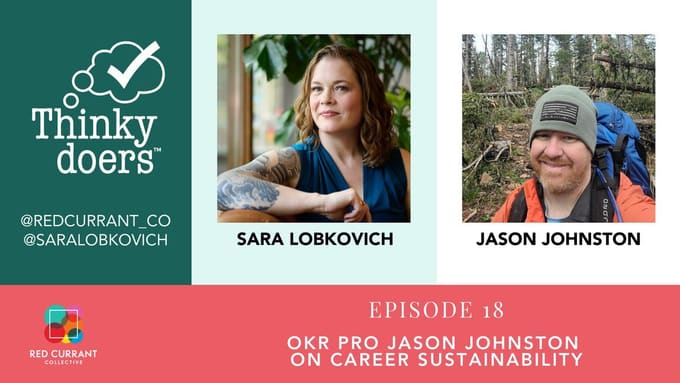High-Stakes Leadership: Navigating Conflict and Setting Boundaries
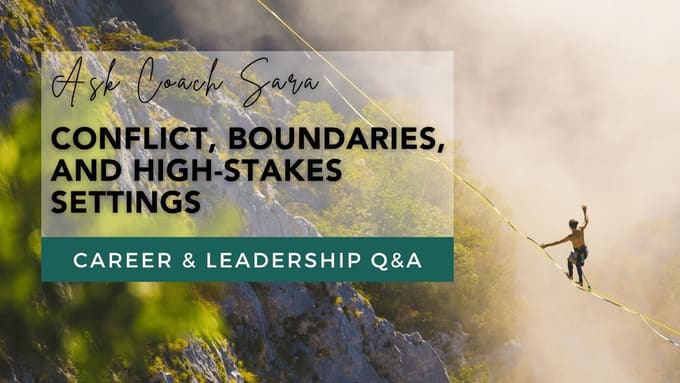

The image choice is perhaps a bit conceptual, but as I was writing this, I was thinking about the balancing act of leadership, and follower-ship, in high-stakes environments.
For whatever reason, I’ve found myself hanging out in a couple of subreddits lately, and when it comes to that type of engagement I seem to have one “gear:” long-winded and exhaustive.
I was thumb-typing out an answer today to one question that really stood out to me because of the scenario, which I am quite familiar with thanks to my other professional life in motorsports, and realized — maybe I should start blogging these instead of just leaving them to the reddit abyss.
So here is the first in a new maybe-series of “Ask a Career and Leadership Pro” blog posts, courtesy of good questions in the r/Leadership, r/Productivity, r/GetMotivated, and/or r/CareerGuidance spaces. For my r/SuggestMeABook and r/NameMyDog answers, you’ll just have to find me on Reddit. 🤣
TL;DR Question:
I’ve been working with a highly skilled but condescending and rude colleague for 2 years in a stressful job. His behavior has negatively affected me, making me irritated and unmotivated. I love my job and don’t want to leave, but I’m struggling with how to handle his behavior. Seeking advice on how to manage this situation without losing my cool or leaving my team.
Sara’s Answer:
OP, I know the type, and the scenario very well. I have a side job in an industry like the one you described, with one of the leadership norms being similar to what you’ve described. I work in a “number two” role in that part of my life, reporting in to and working with the “number one.”
(In my “day job” I am a leadership and career development professional, and I am 30 years into my career, so for me, everything is a curious and fascinating case study — but even I struggle to find my way with leaders like the one you described.)
YMMV, but thinking about myself and the industry I operate in, here are a few thoughts:
First, recognize the leader’s responsibility.
I do remind myself: I would not want the decisionmaking responsibility that my #1 carries. Lives literally depend on the quality with which our team executes our jobs, and, as the #1 they are ultimately responsible for the whole shebang — and I can’t personally imagine having to make decisions in split seconds the way they have to. So in the execution of the work itself, when we are “at work,” I consider it a “feelings-free zone” in favor of our shared performance and the safety of our talent. If things happen during work that we need to address with feedback or conflicts we have to ultimately resolve, we do that the Wednesday after our weekend event, when we’ve all had time to “come down” from the event, do some self-reflection, and be in a better position to debrief in a productive way.
Second, identify, communicate, and hold your boundaries.
I do expect — and I think it is reasonable to expect — leaders to maintain their professional boundaries in and outside of working hours. I also expect that, outside of working hours, if a leader crosses a line, a staffer is safe to set and hold a boundary. For example, “Please don’t call me that, that’s inappropriate and unprofessional,” should be a safe thing to say if a leader crosses a boundary outside of a life and death level scenario (and arguably within one — but depending on the environment the “feelings free-ness” may trump having the convo in the moment). You can’t control a leader’s response to that, but their response is what I consider “interesting information.” If they react poorly, that says something about their judgment (which then says something to me about whether I want to share potential liability with that leader in a high-stakes operating environment). If they aren’t respectful of voiced boundaries, that’s an issue. You get to decide what to do with that information, but for me, certain boundaries are not negotiable.
Watch out for workplaces that use “family” language (or dynamics).
Fields like ours can be very collegial … it is like trauma bonding or Stockholm syndrome sometimes … but a workplace is not a family, and workplaces that use “family” language I am immediately suspicious of. A workplace is an entity where people join together to work toward a specific goal or goals — while some workplaces are healthy and functional and rewarding places to be, they are also places that largely lack any mutuality of loyalty between “loyal” employees and employers.
I don’t know about your family of origin, but a lot of us who wind up in fields like you described come from fucked-up families — so we can quite easily find ourselves comfortable in a workplace that reproduces the dynamics of a fucked-up family, which feels consciously or subconsciously familiar.
For me, those environments have been places for me to reparent myself and ultimately, to practice identifying, setting, and holding boundaries. They’ve also been places where I have refined my own beliefs about and practices in leadership (how to, and how not to do it). And I know each one is a stop on my journey where I will earn a “mini-MBA” in some skill that may be important for me or my future career.
Ready to develop your leadership and goal-setting skills?
Whether you’re navigating a challenging work environment or looking to level up your strategic planning, I can help:
- OKR Coaching — Work with an experienced coach to build clarity and focus
- OKR Training — Learn the methodology to set and achieve meaningful goals
- Book a Q&A Call — 25 minutes to explore if we’re a good match
Develop your own “Stay or Go” litmus test.
My “stay or go” litmus tests:
(1) Am I struggling (and learning something) or am I suffering (and therefore, in a place where I am in survival mode, not learning mode)?
(2) Is this a place where my voiced boundaries are heard and respected?
(3) Have I maximized what I can learn in this environment—because if I’m no longer in a position to learn here, it’s probably time to move on to an environment more conducive to my learning?
(4) Is dissent welcome, in favor of higher performance or increased safety (subject to whatever norms are necessary in your field)? I.e. if I observe a safety violation in the field, am I safe to speak up in the moment, and will I be heard and considered even if I’m ultimately overruled by the #1 for decision-making reasons I don’t envy them having to make? If I observe something short of a safety violation, am I listened to if I bring it up at an appropriate time for consideration?
Recognize the role you play in relationship to your leader.
I have a certain privilege because of my day job — having me on a team is a boon for leaders who want to improve their team performance and improve their leadership skills because in between events, I’m available to them and the team for coaching and performance improvement support. (And I don’t work with leaders who don’t see the value in that.)
But earlier in my career, that wasn’t the case, and I learned a lot from working with a large variety of good, bad, and awful leaders (and a number of “effective” leaders who exhibited leadership characteristics I would never emulate for reasons). I also experienced some abuse here and there, and had to develop my own toolkit for identifying and navigating that (which I think is a part of adulting since it’s likely to happen in some element of life).
Build your toolkit for healthy conflict and identifying and engaging with others’ conflict handling modes.
The last thing I’ll add since this is way too long 🤣 — during one chapter of my career in an unrelated field I took a 40-hour mediation, negotiation, and conflict handling training, and I use those skills literally every day. My default mode with conflict because of my conditioning was to be conflict avoidant, and overly-accommodating of others. Learning to identify peoples’ communication and conflict styles, and building a toolkit for engaging with conflict in a healthy and performance-enhancing way played a HUGE role in the progression of my career (and my career mental health). Something in your message sparked that you mind find that type of professional development a worthwhile investment!
Sending you good thoughts — I hope you find your way to clarity about your next steps!
Key Takeaways:
-
Respect the #1’s responsibility : Their role involves high-stakes decision-making, so during work, focus on performance and safety. Address conflicts after events when everyone is calmer.
-
Set boundaries : It’s reasonable to expect leaders to maintain professionalism. Be ready to communicate and reinforce your boundaries. Their reaction to this is telling.
-
Workplace dynamics : Remember, a workplace isn’t a family. Be cautious of environments that mimic dysfunctional family dynamics.
-
Personal & professional growth: Use challenging environments to learn and set boundaries. Evaluate if you’re learning or just suffering, if your boundaries are respected, and if dissent is welcome for safety and performance.
Have a career or leadership development question?
You don’t have to be a redditor … send it over, and you might see it answered in a future blog post!

From Conflict Avoidant to Confident High-Performer
Strategy coach (and goal nerd), Sara Lobkovich helps organizations and individuals set clear goals, stay focused, and build cultures of growth, learning, and high performance. Skill-building includes increasing healthy conflict within organizations and teams, so that conflict becomes a contributor to high-performance instead of a liability. LEARN MORE →
Best OKR Books of 2025
Curated reading list of the most impactful books on OKRs, strategy, and goal-setting. Includes classics and new releases with honest reviews.
See the List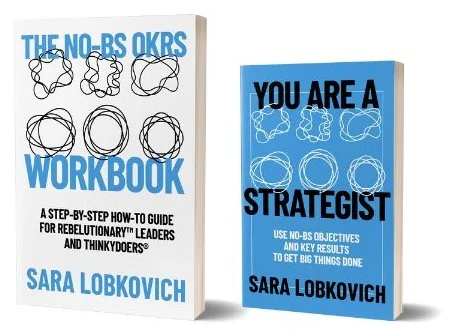
Get the Book
You Are a Strategist teaches you how to use No-BS OKRs to get big things done. Join 2,000+ coaches trained in this methodology.
Order Your Copy